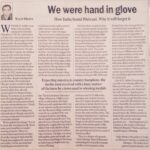When K.D. Jadhav won India’s last wrestling medal at the Helsinki Olympics in 1952 the celebrations at home were extremely muted, restricted to the sports pages of newspapers unlike the megahype now around Sushil Kumar and the new phalanx of Indian boxers. To compound Jadhav’s agony, the political class gave the victorious hockey team of 1952 a tumultuous welcome in ceremonies across the country while he had to make do with a localised cavalcade of a hundred bullock carts from his native village. In 1952, hockey was a potent symbol of Indian nationalism and Jadhav, despite winning independent India’s first individual Olympic medal, was left to die in poverty. In sharp contrast, governmental coffers have already opened up for the Kumars from Beijing. Even more so, in a nation starved of sporting glory, the intense media focus has turned them into new nationalist heroes. Clearly the registers of iconicity have changed in the intervening years, with individual Olympic success becoming an important barometer of nationalist triumph.
What explains the change? Let us be clear: this is not necessarily about some new-found love or understanding of sports. There is a marked disconnect between hype about the resurgent India that the Beijing boys supposedly represent and reality. On the morning that Sushil Kumar won his bronze medal most media outlets carried online stories saying he had “crashed out” of the Olympics. There was even an undertone that he had somehow wasted his first-round bye. Few remembered the repechage rule until the Jat from Najafgarh pleasantly shocked the nation with his marathon string of victories. As reporters struggled for epithets about a shining India, nothing characterised the madness better than the television scrum at Bhiwani. On the day of the two boxing quarterfinals, the squadron of OB vans from various channels stationed at Jitendra Kumar’s village of Devsar cut and run as soon as he lost. Their destination: Vijendra’s village of Kulawas, 10 kilometres away, in anticipation of his fight. This was partly understandable, but as one reporter on the spot pointed out: has Jitendra’s village suddenly ceased to be a symbol of the new resurgent India we are talking about simply because he lost? This after all, was a 20-year-old gallantly fighting the weight of history with 10 stitches below his chin but all that mattered it seems was the ruthless logic of victory. The hype was about nationalism, pure and simple, and that tells us something for the future as India hopes to build on the successes of Beijing.
Television has certainly helped create a national public focused on boxing but with all of India glued to the gripping celebrations in Bhiwani, at least one TV editor is said to have gloated in private that the channels had turned the boxers into heroes. Nothing could be further from the truth. The media went to Bhiwani and to the boxers because it needed the story; expecting awestruck country bumpkins, they were received with a busy matter-of-factness by a town used to winning medals. It is just that it took an Olympic medal for the rest of India to wake up to it. Bhiwani today is home to at least 1500-2000 regular boxers and 10-15,000 active sportspersons. It alone has produced 14 Arjuna awardees and is part of an economy that thrives on local sportsmen making it to the sports quotas of the paramilitary forces, the army and the police. The boxing renaissance here, nurtured by the legendary Captain Hava Singh, has finally blossomed. While India celebrates the spirit of Bhiwani it is important to remember that sporting success is not a pack of instant noodles.
There is a danger of a generic “India Shining” kind of discourse subsuming the real achievements and the real resurgence of the Beijing boys: they emerged from a town which goes sometimes for days without electricity, where the rains have made it impossible to drive a car faster than 5 km/hour on most roads and where most people had to rely on inverters to watch the home boys win. In such a setting, sport is a way out for many. The real success of Bhiwani lies in the rock-solid confidence of the new generation of athletes and a nascent public-private partnership which has allowed them to transcend a system used to mediocrity. They have not been content to merely repeat the past and this is the new Indian spirit that needs to be celebrated.
Like K.D. Jadhav 56 years ago, virtually every winning athlete from Bhiwani in the past — at the Commonwealth Games, the Asiad and the SAF Games — has been welcomed home by celebratory motorcades of locals, except that they were rarely noticed by the mainstream press. Hopefully, the next time this will change, with a more concerted national focus on sport — an approach where the Akhils and the Jitendras who did not win are not forgotten. We need to ask tough questions too — what happened, for instance, to the army’s celebrated Mission Olympics? That would be a tangible legacy of Beijing.
Nalin Mehta is the author of ‘India on Television’ and has co-authored ‘Olympics: The India Story’express@expressindia.com


